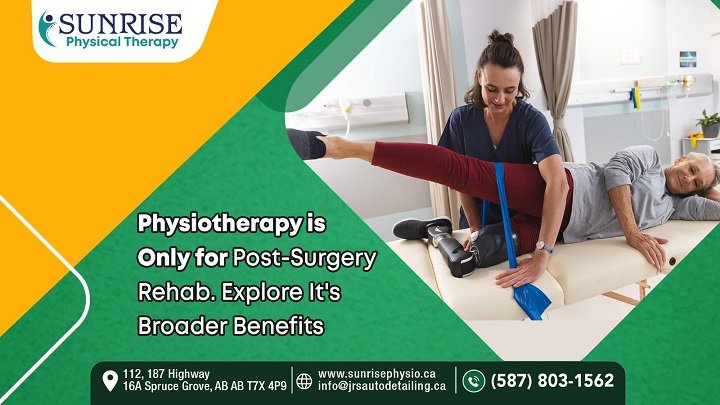When people think of physiotherapy, post-surgical rehabilitation often comes to mind. However, in Spruce Grove, physiotherapy encompasses much broader and offers numerous benefits. Physiotherapy spruce Grove employs various techniques to address individual needs, helping patients achieve their health and wellness goals.
The Broad Scope of Physiotherapy: Enhancing Health
Explore how physiotherapy in Spruce Grove provides comprehensive solutions for overall well-being. It enables individuals to achieve a healthier and more active lifestyle while addressing various physical and mental health needs. Here are the benefits involved, along with specific techniques and exercises,
Preventing Injuries
Injury prevention is one key area where physiotherapy excels. By identifying and addressing areas of weakness, physiotherapists help patients avoid future injuries.
- Functional Strength Training involves exercises designed to replicate everyday movements or job-related tasks, thereby strengthening muscles and joints most susceptible to injury.
- Dynamic Stretching is a critical component of warm-up routines that prepares the muscles for physical activity. For instance, walking lunges are a dynamic stretching exercise where the patient steps forward into a lunge position, bending both knees to lower the body while keeping the torso upright. Then push off with the back leg and step forward into the next lunge. This exercise increases blood flow to the muscles, enhances flexibility, and helps reduce the risk of strains or tears during subsequent physical activities.
Managing Chronic Pain
For chronic pain patients, physiotherapy provides targeted exercises and techniques to alleviate discomfort and improve quality of life.
- Therapeutic Exercises aim to strengthen muscles, improve flexibility, and enhance joint function, which is crucial for managing conditions like chronic lower back pain. For instance, physiotherapists commonly prescribe glute bridges to target the hips and lower back. Glute bridge helps strengthen the glutes and lower back muscles, supporting better posture and alleviating discomfort.
Improving Mobility and Flexibility
Mobility and flexibility are essential for performing daily activities and maintaining independence. Physiotherapy offers exercises that target these areas to keep patients moving smoothly.
- Passive Stretching is a technique where a physiotherapist gently moves the patient’s limbs to stretch the muscles without requiring the patient to exert any effort. This method benefits individuals with severe stiffness, such as those recovering from a stroke or elderly patients. For example, a physiotherapist might stretch a passive hamstring by carefully lifting the patient’s leg while keeping the knee straight. This action helps extend the hamstring muscles and improve flexibility, reducing muscle tightness and overall mobility.
Enhancing Posture and Alignment
Correct posture and alignment are critical for preventing pain and injury. Physiotherapists use specific exercises to correct postural imbalances and promote better alignment.
- Core Stabilization Exercises help to build strength in the deep abdominal and back muscles, which are crucial for supporting the spine and maintaining good posture. An example of such an exercise is the dead bug. In this exercise, the patient lies on their back with arms and knees bent at 90 degrees. They then slowly lower one arm and the opposite leg toward the floor while pressing their lower back into the mat before returning to the starting position. This movement helps enhance core stability, reduces strain on the lower back, and supports the maintenance of a neutral spine posture throughout the day.
- Scapular Stabilization Exercises are essential for strengthening the muscles around the shoulder blades, which aids in proper shoulder alignment and alleviates neck and upper back pain. One effective exercise is the scapular retraction. In this exercise, the patient sits or stands with their back straight and arms relaxed by their sides. They gently squeeze their shoulder blades together, holding this contraction for a few seconds before releasing. This movement enhances the strength of the muscles supporting the shoulder blades, promoting better posture and reducing discomfort in the neck and upper back.
Supporting Mental Health
Physical activity is a tool for mental well-being, and physiotherapy plays a significant role in managing stress, anxiety, and depression through exercise.
- Mindful Movement Practices: Techniques such as yoga are often incorporated into physiotherapy to improve physical and mental health. These practices involve slow, controlled movements combined with deep breathing, which help reduce stress and improve focus.
- Cardiovascular Exercises: Aerobic activities like walking, cycling, and aerobics improve cardiovascular health and boost mental well-being by increasing the production of endorphins. Physiotherapists can design a low-impact cardio routine tailored to the patient’s fitness level and health needs.
Experience Comprehensive Physiotherapy Benefits at Sunrise Clinic
Physiotherapy in Spruce Grove offers many benefits beyond post-surgical rehabilitation Spruce Grove, providing practical solutions tailored to individual needs. The physiotherapists utilize physiotherapy techniques to enhance overall well-being, enabling patients to lead healthier, more active lives. Those interested in experiencing the broader benefits of physiotherapy and searching for a “physiotherapist near me” are encouraged to contact Sunrise Physical Therapy Clinic to schedule a consultation. The dedicated team at our physiotherapy clinic help individuals achieve their health and wellness goals, regardless of their stage in life. In Spruce Grove, physiotherapy services offer tailored treatments to enhance mobility and reduce pain. Discover how physiotherapy can provide unexpected benefits—reach out today.
Read More: Experience Comprehensive Physiotherapy

